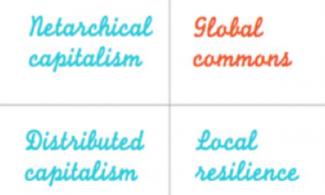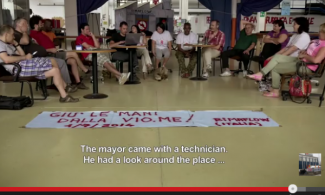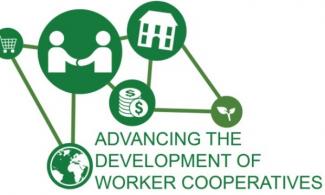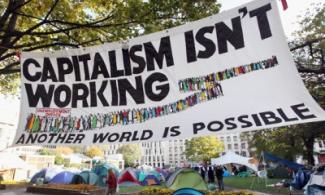Here's my main point:
We need to move beyond moral outrage to new ways of thinking strategically about our predicament.
#Occupy Wall Street is certainly an interesting event as well as an important experience for many people in determining how they want to relate to the current state of abuse from on high. There are (and will be) many things to interpret and many meanings to make of it and its consequences.
I support it, and am thrilled it is happening. However, I have a very particular focus. I want to comment on one feature that I oppose very strongly, the practice of reading our current predicament from strong moral perspectives. Chris Hedges gives us an over-the-top display of this tendency:
There are no excuses left. Either you join the revolt taking place on Wall Street and in the financial districts of other cities across the country or you stand on the wrong side of history. Either you obstruct, in the only form left to us, which is civil disobedience, the plundering by the criminal class on Wall Street and accelerated destruction of the ecosystem that sustains the human species, or become the passive enabler of a monstrous evil. Either you taste, feel and smell the intoxication of freedom and revolt or sink into the miasma of despair and apathy. Either you are a rebel or a slave.
I'm rather boring in how I look at these kinds of exciting and significant events, which might be a result of my powerful experience in the Columbia University student rebellion of 1968. I look at them and most things political, from an intense strategic point of view. How can we make the world work well, even a lot better than it has up till now? This requires relating to the way things really are, not the way I or you or we think they should be. There is nothing more frustrating than trying very hard to solve the wrong problem over and over and over.
One thing that seems to stand out as a particularly hard-nosed fact of life is that about 80% of our fellow citizens do not feel the current economic travesties and political quagmire threaten their self-interest that much. Certainly, not enough to rouse them out of their living rooms. (This doesn't make them serfs.) They do want to see things get better, and will feel very good when-if?-that happens. But this is just the butter on their bread, maybe even the jam. This is not a peculiar fact, but seems to have become progressively a dominant fact of the modern world over the past few centuries.
This is not a moral problem. It's a practical problem, a profound behavioral conundrum crying out for some kind of strategic wisdom to find a way forward.
Governments have enormous power (as do big corporations) to satisfy people's basic self-interests-peace and order, individual freedom, protection from an ?Al Qaeda', income, house, access to the internet, etc. Who wants to be without these things? The great providers-government, banks, and big corporations-have this power because they have proven that most of the time they will do this job to the general satisfaction of the 80+%. As a result of this feat, this large group of citizens-which includes most of us-acquiesces to them having all this power, and, gradually, more of it.
That's the first pincer of the great modern social trap we are caught in. The second is that having all this power the great providers become an awful threat to those same self-interests of ours, the ones they serve relatively well. So not only do we the 80+% acquiesce to their existence and the power they accumulate, but we dare not pose any serious threat to their interests. As a result,
- the big providers accumulate more power to satisfy, which
- leads to more acquiescence to the big providers, which
- leads to more power for exploitation
- and less power for genuine solidarity.
Do you see the conundrum? In the end an ingenious and widely successful system of large scale coordination for satisfying legitimate personal and collective interests now threatens all life on the planet. Very possibly the wondrous human train has lost its control, and is now running down the side of a steep mountain.
What chance does a disparate, spreading protest movement have of posing a significant threat to this operating system? At Columbia University in 1968 we seemed to pose a serious threat. So the police wiped it out in an evening, and things returned to normal. Opposition of moral outrage to the Vietnam War was vociferous, prolonged, and brilliantly tactical in many ways. It succeeded in driving Lyndon Johnson out of office and getting Richard Nixon elected. Then came Reagan...Bush I...Clinton...Bush II...and now the Obama of audacious hope with Rick Perry standing in the wings.
So much for the strategic power of moral outrage. It's just not up to the job.
We need to move beyond moral outrage to new ways of thinking strategically about our predicament.





Add new comment